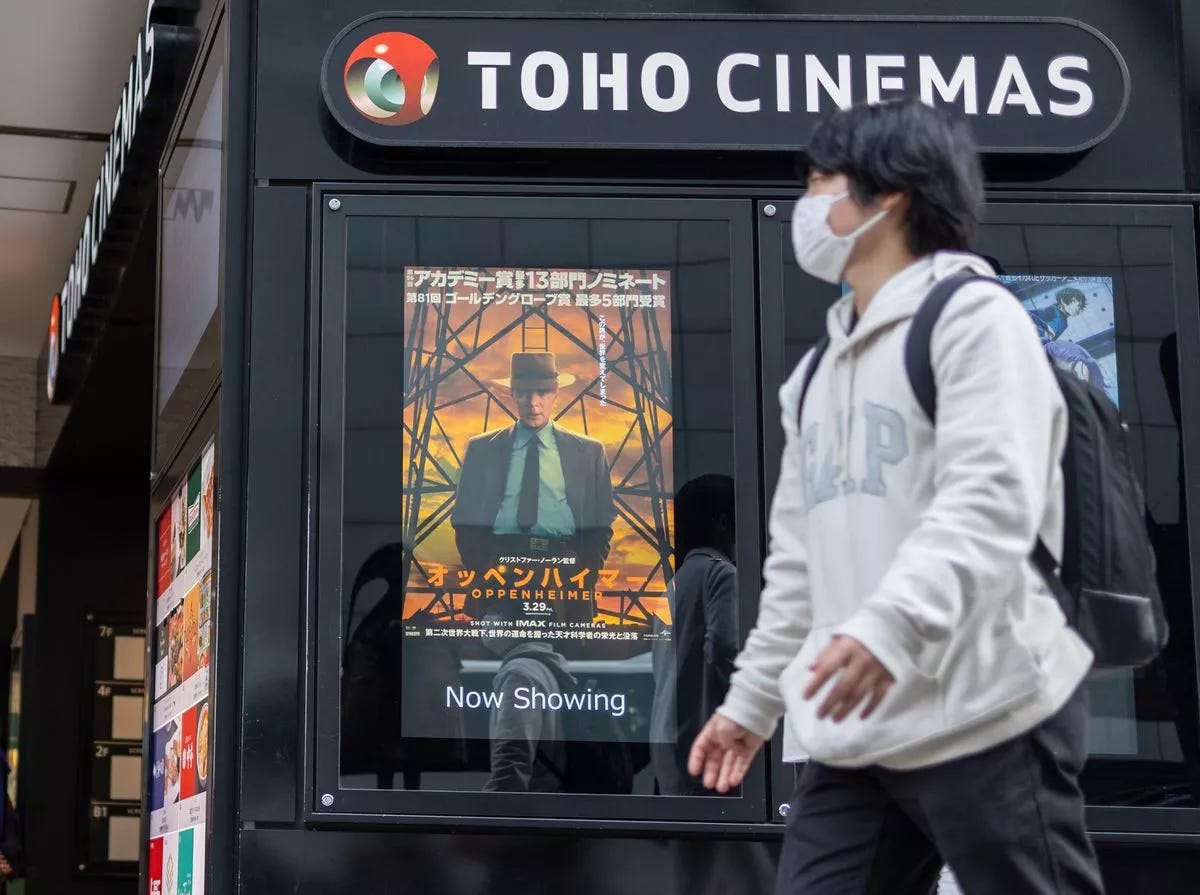Reprinted with permission from Greg Mitchell’s newsletter Oppenheimer: From Hiroshima to Hollywood.

Going back to last July, I have covered reactions to the Christopher Nolan movie in Japan – sight unseen, since it did not find a distributor there. Then a late-March opening was announced, and that did happen on Friday. Just in time for this brief SNL comment, a lie but with bite, that it had been released in Japan “without warning.”
But what do the Japanese think of it?
It’s a holiday weekend so I don’t have time for a deep dive but here are excerpts from a few articles. First, the BBC interviewed Hiroshima residents, watch here.
NPR:
In the city of Nagasaki, the second city to be devastated by a nuclear weapon, just three days after Hiroshima, housewife Tsuyuko Iwanai shared her thoughts as she exited the theater.
“The film was only about the side that dropped the A-bomb,” she noted. “I wish they had included the side it was dropped on.”
“But then I thought you might think about it differently, if you’re in a different position,” she added.
Indeed, one of the most controversial points about Oppenheimer is director Christopher Nolan’s choice not to directly depict the carnage and agony that the atomic bombs unleashed on Hiroshima and Nagasaki, but instead to focus on Oppenheimer.
Reuters reported that some cinemas in Japan displayed signs warning moviegoers that the film contains images like nuclear tests that might trigger memories of the bombs.
New York Post:
“Of course this is an amazing film which deserves to win the Academy Awards. But the film also depicts the atomic bomb in a way that seems to praise it, and, as a person with roots in Hiroshima, I found it difficult to watch,” said Hiroshima resident Kawai, 37. Kawai, a civil servant, saw “Oppenheimer” on opening day at a cinema just a kilometer from the city’s Atomic Bomb Dome. “I’m not sure this is a film that Japanese people should make a special effort to watch,” he added.
Some in Japan also took offense to the “Barbenheimer” phenomenon – that associated “Oppenheimer” with the comedy “Barbie” since both opened on the same day this summer – saying it trivialized what they endured from the bombs.
IMDB:
Oppenheimer has finally been released in Japan, and despite the controversies, it has opened to a positive number at the box office.
According to Trade Analyst Luiz Fernando, Oppenheimer posts an estimated $800K opening day at Japan’s box office. The report further claims this Cillian Murphy led has made two times more than what Dune 2 grossed on its pure Friday upon its release two weeks back
NME:
With the film now having been released in the country, the Mayor of Hiroshima has been critical, saying (via Associated Press): “From Hiroshima’s standpoint, the horror of nuclear weapons was not sufficiently depicted. The film was made in a way to validate the conclusion that the atomic bomb was used to save the lives of Americans.”
Bulletin of Atomic Scientists:
Suzuki Tatsujiro, a nuclear engineer with advanced degrees from Tokyo University and the Massachusetts Institute of Technology who served as the vice chair of the Japan Atomic Energy Commission and is the vice director of the Research Center for Nuclear Weapons Abolition at Nagasaki University, appreciated Nolan’s investigation of “the social implications of scientific innovation and the relationship between scientists and politics.” At the same time, he was disappointed the movie “did not address the responsibility of the US government decision to drop the bomb” and “ignored the voices of victims.”
AP:
Some moviegoers offered praise. One man emerging from a Tokyo theater Friday said the movie was great, stressing that the topic was of great interest to Japanese, although emotionally volatile as well. Another said he got choked up over the film’s scenes depicting Oppenheimer’s inner turmoil. Neither man would give his name to an Associated Press journalist.
Others suggested the world might be ready for a Japanese response to that story.
Takashi Yamazaki, director of “Godzilla Minus One,” which won the Oscar for visual effects and is a powerful statement on nuclear catastrophe in its own way, suggested he might be the man for that job.
“I feel there needs to be an answer from Japan to ‘Oppenheimer.’ Someday, I would like to make that movie,” he said.
Thanks for reading Oppenheimer: From Hiroshima to Hollywood! Subscribe for free to receive new posts and support my work.
Greg Mitchell is the author of a dozen books, including “Hiroshima in America,” and the recent award-winning The Beginning or the End: How Hollywood – and America – Learned to Stop Worrying and Love the Bomb, and has directed three documentary films since 2021, including two for PBS (plus award-winning “Atomic Cover-up”). He has written widely about the atomic bomb and atomic bombings, and their aftermath, for over forty years. He writes often at Oppenheimer: From Hiroshima to Hollywood.
